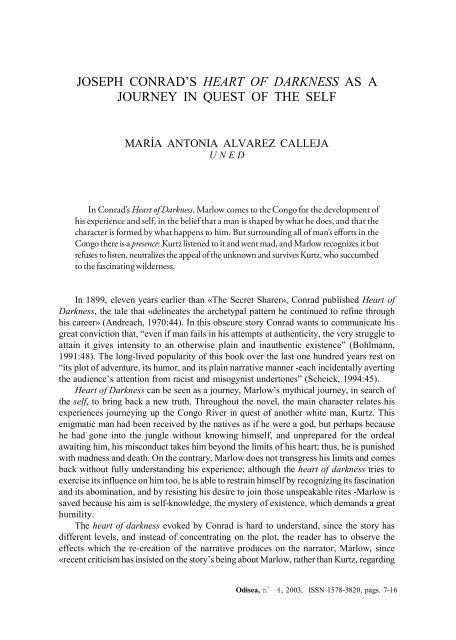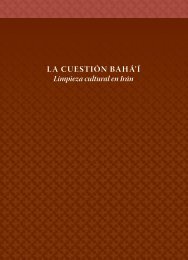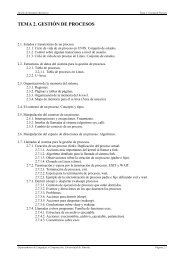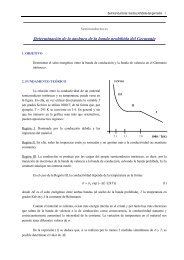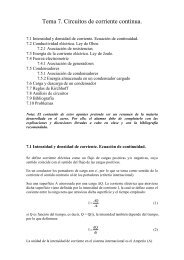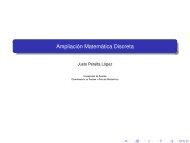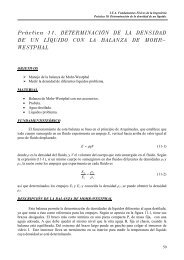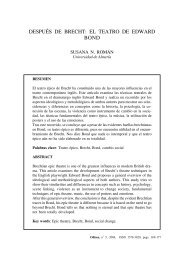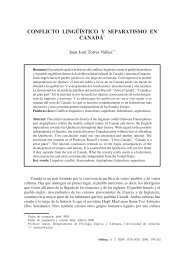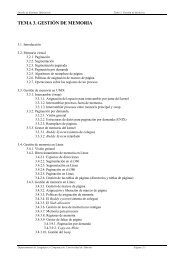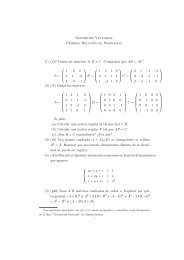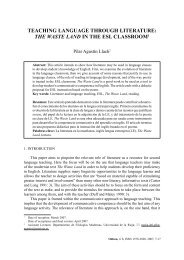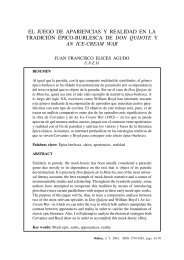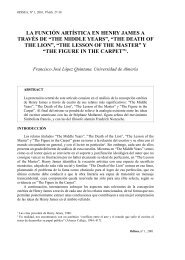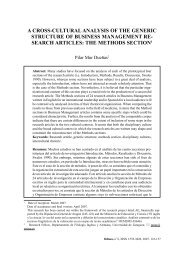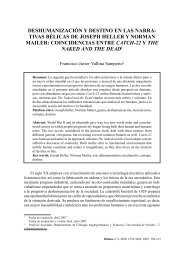joseph conrad''s heart of darkness as a journey in quest of the self
joseph conrad''s heart of darkness as a journey in quest of the self
joseph conrad''s heart of darkness as a journey in quest of the self
Create successful ePaper yourself
Turn your PDF publications into a flip-book with our unique Google optimized e-Paper software.
JOSEPH CONRAD’S HEART OF DARKNESS AS A<br />
JOURNEY IN QUEST OF THE SELF<br />
MARÍA ANTONIA ALVAREZ CALLEJA<br />
U N E D<br />
In Conrad’s Heart <strong>of</strong> Darkness, Marlow comes to <strong>the</strong> Congo for <strong>the</strong> development <strong>of</strong><br />
his experience and <strong>self</strong>, <strong>in</strong> <strong>the</strong> belief that a man is shaped by what he does, and that <strong>the</strong><br />
character is formed by what happens to him. But surround<strong>in</strong>g all <strong>of</strong> man’s efforts <strong>in</strong> <strong>the</strong><br />
Congo <strong>the</strong>re is a presence: Kurtz listened to it and went mad, and Marlow recognizes it but<br />
refuses to listen, neutralizes <strong>the</strong> appeal <strong>of</strong> <strong>the</strong> unknown and survives Kurtz, who succumbed<br />
to <strong>the</strong> f<strong>as</strong>c<strong>in</strong>at<strong>in</strong>g wilderness.<br />
In 1899, eleven years earlier than «The Secret Sharer», Conrad published Heart <strong>of</strong><br />
Darkness, <strong>the</strong> tale that «del<strong>in</strong>eates <strong>the</strong> archetypal pattern he cont<strong>in</strong>ued to ref<strong>in</strong>e through<br />
his career» (Andreach, 1970:44). In this obscure story Conrad wants to communicate his<br />
great conviction that, “even if man fails <strong>in</strong> his attempts at au<strong>the</strong>nticity, <strong>the</strong> very struggle to<br />
atta<strong>in</strong> it gives <strong>in</strong>tensity to an o<strong>the</strong>rwise pla<strong>in</strong> and <strong>in</strong>au<strong>the</strong>ntic existence” (Bohlmann,<br />
1991:48). The long-lived popularity <strong>of</strong> this book over <strong>the</strong> l<strong>as</strong>t one hundred years rest on<br />
“its plot <strong>of</strong> adventure, its humor, and its pla<strong>in</strong> narrative manner -each <strong>in</strong>cidentally avert<strong>in</strong>g<br />
<strong>the</strong> audience’s attention from racist and misogynist undertones” (Scheick, 1994:45).<br />
Heart <strong>of</strong> Darkness can be seen <strong>as</strong> a <strong>journey</strong>, Marlow’s mythical <strong>journey</strong>, <strong>in</strong> search <strong>of</strong><br />
<strong>the</strong> <strong>self</strong>, to br<strong>in</strong>g back a new truth. Throughout <strong>the</strong> novel, <strong>the</strong> ma<strong>in</strong> character relates his<br />
experiences <strong>journey</strong><strong>in</strong>g up <strong>the</strong> Congo River <strong>in</strong> <strong>quest</strong> <strong>of</strong> ano<strong>the</strong>r white man, Kurtz. This<br />
enigmatic man had been received by <strong>the</strong> natives <strong>as</strong> if he were a god, but perhaps because<br />
he had gone <strong>in</strong>to <strong>the</strong> jungle without know<strong>in</strong>g him<strong>self</strong>, and unprepared for <strong>the</strong> ordeal<br />
await<strong>in</strong>g him, his misconduct takes him beyond <strong>the</strong> limits <strong>of</strong> his <strong>heart</strong>; thus, he is punished<br />
with madness and death. On <strong>the</strong> contrary, Marlow does not transgress his limits and comes<br />
back without fully understand<strong>in</strong>g his experience; although <strong>the</strong> <strong>heart</strong> <strong>of</strong> <strong>darkness</strong> tries to<br />
exercise its <strong>in</strong>fluence on him too, he is able to restra<strong>in</strong> him<strong>self</strong> by recogniz<strong>in</strong>g its f<strong>as</strong>c<strong>in</strong>ation<br />
and its abom<strong>in</strong>ation, and by resist<strong>in</strong>g his desire to jo<strong>in</strong> those unspeakable rites -Marlow is<br />
saved because his aim is <strong>self</strong>-knowledge, <strong>the</strong> mystery <strong>of</strong> existence, which demands a great<br />
humility.<br />
The <strong>heart</strong> <strong>of</strong> <strong>darkness</strong> evoked by Conrad is hard to understand, s<strong>in</strong>ce <strong>the</strong> story h<strong>as</strong><br />
different levels, and <strong>in</strong>stead <strong>of</strong> concentrat<strong>in</strong>g on <strong>the</strong> plot, <strong>the</strong> reader h<strong>as</strong> to observe <strong>the</strong><br />
effects which <strong>the</strong> re-creation <strong>of</strong> <strong>the</strong> narrative produces on <strong>the</strong> narrator, Marlow, s<strong>in</strong>ce<br />
«recent criticism h<strong>as</strong> <strong>in</strong>sisted on <strong>the</strong> story’s be<strong>in</strong>g about Marlow, ra<strong>the</strong>r than Kurtz, regard<strong>in</strong>g<br />
Odisea, n º 4, 2003, ISSN 1578-3820, pags. 7-16
8 MARÍA ANTONIA ALVAREZ CALLEJA<br />
it <strong>as</strong> a <strong>journey</strong> <strong>in</strong>to Marlow’s consciousness» (Kirschner, 1968:47). Thus, although Marlow<br />
does not want to bo<strong>the</strong>r his audience with what happened to him personally, «yet to<br />
understand <strong>the</strong> effect <strong>of</strong> it on me you ought to know how I got out <strong>the</strong>re, what I saw, how I<br />
went up that river to <strong>the</strong> place where I first met <strong>the</strong> poor chap» (p.5). For this re<strong>as</strong>on, <strong>the</strong><br />
ma<strong>in</strong> purpose <strong>of</strong> this paper is to look for <strong>the</strong> clues which can illustrate those changes<br />
produced on Marlow by <strong>the</strong> events which take place while penetrat<strong>in</strong>g <strong>in</strong>to <strong>the</strong> <strong>heart</strong> <strong>of</strong><br />
<strong>darkness</strong>.<br />
Marlow’s story starts with “a k<strong>in</strong>d <strong>of</strong> frame-narrator’s grave, quiet, brood<strong>in</strong>g voice”,<br />
and this voice commits us, from <strong>the</strong> beg<strong>in</strong>n<strong>in</strong>g, to “<strong>the</strong> <strong>in</strong>terior resonance <strong>of</strong> <strong>the</strong> story”<br />
employ<strong>in</strong>g <strong>the</strong> first person, “to move free where he wishes <strong>in</strong> time, and <strong>the</strong>refore free to<br />
foreshadow his conclusion” (Henricksen, 1992:27). Conrad <strong>in</strong>troduces us <strong>in</strong>to <strong>the</strong> narrative,<br />
stat<strong>in</strong>g how his ma<strong>in</strong> character had a p<strong>as</strong>sion for maps s<strong>in</strong>ce he w<strong>as</strong> a little boy:<br />
I would look for hours at South America, or Africa, or Australia, and lose my<strong>self</strong> <strong>in</strong> all<br />
<strong>the</strong> glories <strong>of</strong> exploration. At that time <strong>the</strong>re were many blank spaces on <strong>the</strong> earth... by this<br />
time it w<strong>as</strong> not a blank space any more... It had ce<strong>as</strong>ed to be a blank space <strong>of</strong> delightful<br />
mystery... It had become a place <strong>of</strong> <strong>darkness</strong>. But <strong>the</strong>re w<strong>as</strong> <strong>in</strong> it one river especially, a<br />
mighty big river, that you could see on <strong>the</strong> map, resembl<strong>in</strong>g an immense snake uncoiled,<br />
with its head <strong>in</strong> <strong>the</strong> sea, its body at rest curv<strong>in</strong>g afar (pp.5-6).<br />
Through <strong>the</strong> whole story, <strong>darkness</strong> means for Conrad savagery, primitivism, s<strong>in</strong>ce <strong>the</strong><br />
contr<strong>as</strong>t between light/dark, related to <strong>the</strong> civilized/uncivilized dichotomy, h<strong>as</strong> <strong>the</strong><br />
connotations <strong>of</strong> good/evil. Also <strong>the</strong> reference to <strong>the</strong> river suggests <strong>darkness</strong>, s<strong>in</strong>ce it br<strong>in</strong>gs<br />
<strong>the</strong> snake image -a Biblical symbol <strong>of</strong> evil- which makes Eve disobey God and eat <strong>the</strong><br />
forbidden fruit.<br />
At <strong>the</strong> open<strong>in</strong>g <strong>of</strong> <strong>the</strong> story, while recall<strong>in</strong>g his childhood f<strong>as</strong>c<strong>in</strong>ation with blank<br />
spaces on maps, Marlow -<strong>the</strong> teller <strong>of</strong> <strong>the</strong> story-with<strong>in</strong>-a-story, who h<strong>as</strong> a perspective at<br />
once <strong>in</strong>trigu<strong>in</strong>g and <strong>quest</strong>ionable- evokes a feel<strong>in</strong>g <strong>of</strong> <strong>darkness</strong> dur<strong>in</strong>g his explanation <strong>of</strong><br />
what happened to him “one even<strong>in</strong>g”, when he set out to encounter <strong>the</strong> wilderness. At this<br />
moment, we have <strong>the</strong> prophetic vision <strong>of</strong> <strong>the</strong> <strong>darkness</strong> that Marlow will f<strong>in</strong>d <strong>in</strong> his <strong>journey</strong><br />
through his experience <strong>in</strong> <strong>the</strong> jungle:<br />
But <strong>as</strong> I stood on this hillside, I foresaw that <strong>in</strong> <strong>the</strong> bl<strong>in</strong>d<strong>in</strong>g sunsh<strong>in</strong>e <strong>of</strong> that land I<br />
would become acqua<strong>in</strong>ted with a flabby, pretend<strong>in</strong>g, weak-eyed devil <strong>of</strong> a rapacious and<br />
pitiless folly. How <strong>in</strong>sidious he could be, too, I w<strong>as</strong> only to f<strong>in</strong>d out several months later<br />
and a thousand miles far<strong>the</strong>r. For a moment I stood appalled, <strong>as</strong> though by a warn<strong>in</strong>g<br />
(p.13).<br />
In <strong>the</strong> grow<strong>in</strong>g <strong>darkness</strong>, Marlow is los<strong>in</strong>g <strong>the</strong> thread <strong>of</strong> <strong>the</strong> story. Most importantly, he<br />
compares <strong>the</strong> narrative to a dream, which may be responsible for <strong>the</strong> k<strong>in</strong>d <strong>of</strong> discursive<br />
distortion that affects <strong>the</strong> story it<strong>self</strong>. In this way, “we are made aware <strong>of</strong> Kurtz’s symbolic<br />
role through <strong>the</strong> recurrent dream-imagery, which locates him <strong>as</strong> a phantom <strong>in</strong> Marlow’s<br />
dream” (Geroski, 1978:73):<br />
Odisea, n º 4, 2003
JOSEPH CONRAD’S HEART OF DARKNESS AS A JOURNEY IN QUEST OF THE SELF<br />
9<br />
It seems to me I am try<strong>in</strong>g to tell you a dream -mak<strong>in</strong>g a va<strong>in</strong> attempt, because no<br />
relation <strong>of</strong> a dream can convey <strong>the</strong> dream-sensation, absurdity, surprise, and bewilderment<br />
<strong>in</strong> a tremor <strong>of</strong> struggl<strong>in</strong>g revolt, that notion <strong>of</strong> be<strong>in</strong>g captured by <strong>the</strong> <strong>in</strong>credible which is<br />
<strong>of</strong> <strong>the</strong> very essence <strong>of</strong> dreams (p.24).<br />
After warn<strong>in</strong>g <strong>the</strong> reader that <strong>the</strong> story is a dream, Marlow is free to tell his subjective<br />
experience, <strong>in</strong>volv<strong>in</strong>g his audience <strong>in</strong> this drama <strong>of</strong> <strong>darkness</strong> which h<strong>as</strong> no solution: «No,<br />
it is impossible; it is impossible to convey <strong>the</strong> life-sensation <strong>of</strong> any given epoch <strong>of</strong> one’s<br />
existence-that which makes its truth, its mean<strong>in</strong>g-its subtle and penetrat<strong>in</strong>g essence. It is<br />
impossible. We live, <strong>as</strong> we dream-alone» (p.24). Here <strong>the</strong> narrator <strong>in</strong>troduces <strong>the</strong> seem<strong>in</strong>g<br />
<strong>the</strong>me: <strong>in</strong> this <strong>journey</strong> <strong>in</strong> search <strong>of</strong> Kurtz, noth<strong>in</strong>g is real but only <strong>as</strong> it appears to Marlow.<br />
Thus his confession: «Of course <strong>in</strong> this you fellows see more than I could <strong>the</strong>n. You see me,<br />
whom you know...» (p.24). At this po<strong>in</strong>t <strong>the</strong> <strong>darkness</strong> is so <strong>in</strong>tense that <strong>the</strong> listeners can<br />
hardly discern one ano<strong>the</strong>r. However, <strong>the</strong> frame-narrator, <strong>as</strong> an ideal reader aware <strong>of</strong> <strong>the</strong><br />
mechanism <strong>of</strong> Marlow’s story-tell<strong>in</strong>g, does not miss a word <strong>of</strong> what is be<strong>in</strong>g told:<br />
For a long time already he, sitt<strong>in</strong>g apart, had been no more to us than a voice. There<br />
w<strong>as</strong> not a word from anybody. The o<strong>the</strong>rs might have been <strong>as</strong>leep, but I w<strong>as</strong> awake. I<br />
listened, I listened on <strong>the</strong> watch for <strong>the</strong> sentence, for <strong>the</strong> word, that would give me <strong>the</strong><br />
clue to <strong>the</strong> fa<strong>in</strong>t une<strong>as</strong><strong>in</strong>ess <strong>in</strong>spired by this narrative that seemed to shape it<strong>self</strong> without<br />
human lips <strong>in</strong> <strong>the</strong> heavy night air <strong>of</strong> <strong>the</strong> river (p.24).<br />
Marlow’s perceptions go on relentlessly for <strong>the</strong> narrator to make <strong>the</strong> whole story out <strong>of</strong><br />
<strong>the</strong>m, out <strong>of</strong> what he sees, hears and understands. In fact, from <strong>the</strong> beg<strong>in</strong>n<strong>in</strong>g <strong>of</strong> <strong>the</strong> story we<br />
are able to note <strong>the</strong> effect <strong>of</strong> his own words on <strong>the</strong> audience: «And this also,» said Marlow<br />
suddenly, «h<strong>as</strong> been one <strong>of</strong> <strong>the</strong> dark places <strong>of</strong> <strong>the</strong> earth» (p.3). On this occ<strong>as</strong>ion he h<strong>as</strong> said<br />
someth<strong>in</strong>g ra<strong>the</strong>r odd, and his remark is received with silence, which is even more odd. But<br />
<strong>the</strong>n <strong>the</strong> silence is expla<strong>in</strong>ed by <strong>the</strong> narrator <strong>as</strong> natural, not odd at all, <strong>as</strong> if noth<strong>in</strong>g unusual<br />
had happened; he h<strong>as</strong> simply made a Marlow-like remark, so typical <strong>of</strong> him <strong>as</strong> to be<br />
literally unremarkable: «His remark did not seem at all surpris<strong>in</strong>g. It w<strong>as</strong> just like Marlow.<br />
It w<strong>as</strong> accepted <strong>in</strong> silence. No one took <strong>the</strong> trouble to grunt even» (p.3).<br />
Most <strong>of</strong> <strong>the</strong> times, dur<strong>in</strong>g <strong>the</strong> <strong>journey</strong> through <strong>the</strong> forest, Marlow is silent, listen<strong>in</strong>g.<br />
And <strong>the</strong> effects this world h<strong>as</strong> on him are ma<strong>in</strong>ly <strong>the</strong> abstract feel<strong>in</strong>gs that <strong>the</strong> wilderness<br />
raises <strong>in</strong> his imag<strong>in</strong>ation:<br />
There were moments when one’s p<strong>as</strong>t came back to one, <strong>as</strong> it will sometimes when you<br />
have not a moment to spare to your<strong>self</strong>; but it came <strong>in</strong> <strong>the</strong> shape <strong>of</strong> an unrestful and noisy<br />
dream, remembered with wonder amongst <strong>the</strong> overwhelm<strong>in</strong>g realities <strong>of</strong> this strange<br />
world <strong>of</strong> plants, and water and silence. And this stillness <strong>of</strong> life did not <strong>in</strong> <strong>the</strong> le<strong>as</strong>t<br />
resemble a peace. It w<strong>as</strong> <strong>the</strong> stillness <strong>of</strong> an implacable force brood<strong>in</strong>g over an <strong>in</strong>scrutable<br />
<strong>in</strong>tention. It looked at you with a vengeful <strong>as</strong>pect (p.30).<br />
Marlow is ra<strong>the</strong>r excited at <strong>the</strong> prospect <strong>of</strong> meet<strong>in</strong>g Kurtz, a character who never<br />
gets to be a flesh-and-blood person, but who is <strong>the</strong> only one who can solve <strong>the</strong> enigm<strong>as</strong> <strong>of</strong><br />
Odisea, n º 4, 2003
10 MARÍA ANTONIA ALVAREZ CALLEJA<br />
this world. Now Marlow is aware <strong>of</strong> his defences aga<strong>in</strong>st <strong>the</strong> wilderness, and his way <strong>of</strong><br />
fight<strong>in</strong>g aga<strong>in</strong>st <strong>the</strong> powerful nature which surrounds him is by keep<strong>in</strong>g his imag<strong>in</strong>ation<br />
busy: «I had no time. I had to keep guess<strong>in</strong>g at <strong>the</strong> channel; I had to discern, mostly by<br />
<strong>in</strong>spiration, <strong>the</strong> signs <strong>of</strong> hidden banks; I watched for sunken stones... I had to keep a<br />
lookout for <strong>the</strong> signs <strong>of</strong> dead wood» (p.30). However, he dist<strong>in</strong>guishes between <strong>the</strong> mere<br />
<strong>in</strong>cidents <strong>of</strong> <strong>the</strong> surface and <strong>the</strong>ir reality, and what should have been only a device -that is,<br />
<strong>the</strong> structure <strong>of</strong> <strong>the</strong> narrative- “h<strong>as</strong> become <strong>the</strong> ma<strong>in</strong> agent <strong>of</strong> <strong>the</strong> tale’s effect”, s<strong>in</strong>ce what<br />
Conrad had sought “by extend<strong>in</strong>g <strong>the</strong> tension produced by rhythm, rhetoric and imagery”<br />
is achieved <strong>in</strong> Heart <strong>of</strong> Darkness “by <strong>in</strong>volv<strong>in</strong>g <strong>the</strong> reader <strong>in</strong> an <strong>in</strong>tellectual drama without<br />
a solution» (Ambros<strong>in</strong>i, 1991:114). Although all k<strong>in</strong>ds <strong>of</strong> responses are demanded, every<br />
time Marlow <strong>as</strong>ks his audience: «do you understand?», he is him<strong>self</strong> <strong>the</strong> one who cannot<br />
understand what he is hear<strong>in</strong>g <strong>in</strong> his imag<strong>in</strong>ation; thus his <strong>journey</strong> through <strong>the</strong> wilderness<br />
search<strong>in</strong>g for Kurtz, who will help him to <strong>in</strong>terpret <strong>the</strong> silence <strong>of</strong> <strong>the</strong> jungle: «Towards <strong>the</strong><br />
even<strong>in</strong>g <strong>of</strong> <strong>the</strong> second day we judged ourselves about eight miles from Kurtz’s station. I<br />
wanted to push on» (p.35).<br />
The une<strong>as</strong><strong>in</strong>ess <strong>the</strong> travelers feel on <strong>the</strong>ir approach to Kurtz’s station is expressed by<br />
us<strong>in</strong>g o<strong>the</strong>r narrative methods: by Conrad <strong>in</strong>troduc<strong>in</strong>g <strong>the</strong> hear<strong>in</strong>g-see<strong>in</strong>g <strong>the</strong>me, <strong>in</strong> order<br />
to express <strong>the</strong> change from silence/stillness <strong>in</strong>to noise/action,<br />
...a cry, a very loud cry, <strong>as</strong> <strong>of</strong> <strong>in</strong>f<strong>in</strong>ite desolation, soared slowly <strong>in</strong> <strong>the</strong> opaque air. It<br />
ce<strong>as</strong>ed. A compla<strong>in</strong><strong>in</strong>g clamor, modulated <strong>in</strong> savage discords, filled our ears. The sheer<br />
unexpectedness <strong>of</strong> it made my hair stir under my cap. I don’t know how it struck <strong>the</strong><br />
o<strong>the</strong>rs: to me it seemed <strong>as</strong> though <strong>the</strong> mist it<strong>self</strong> had screamed, so suddenly, and apparently<br />
from all sides at once, did this tumultuous and mournful uproar arise (p.37).<br />
William W. Bancr<strong>of</strong>t h<strong>as</strong> affirmed that “hardship produces terrible suffer<strong>in</strong>gs <strong>in</strong> exile,<br />
sacrifice and struggles; <strong>the</strong>se excite admiration and pronounce <strong>the</strong> heroic <strong>in</strong> those who rise<br />
above <strong>the</strong>m, but when <strong>the</strong>re is no moral stress to call forth <strong>the</strong> fibre <strong>of</strong> <strong>the</strong> deeper man, to<br />
br<strong>in</strong>g out latent powers <strong>of</strong> m<strong>in</strong>d and will, <strong>the</strong> tragedy is supreme!” (1931:46). Marlow’s<br />
worst moments <strong>in</strong> Heart <strong>of</strong> Darkness are when he is compelled to understand that <strong>the</strong> great<br />
adventure <strong>of</strong> his life, to which he is devot<strong>in</strong>g such a great efforts, is really a bus<strong>in</strong>ess <strong>of</strong><br />
death. Congo is splendid; like its people it h<strong>as</strong> a wild vitality, an <strong>in</strong>tense energy <strong>of</strong><br />
movement, but it is marked by <strong>darkness</strong> and death: “streams <strong>of</strong> death <strong>in</strong> life, <strong>in</strong> <strong>the</strong> extremity<br />
<strong>of</strong> an impotent despair; <strong>the</strong> jungle drives white men mad because <strong>of</strong> its solitude: <strong>the</strong>re is<br />
nobody, not a hut, <strong>the</strong>re is only death, <strong>the</strong> death <strong>of</strong> many men, <strong>the</strong> death <strong>of</strong> ethical behavior,<br />
<strong>the</strong> death <strong>of</strong> goodness and civility, <strong>the</strong> death, crucially, <strong>of</strong> our authority <strong>as</strong> selves” (Gl<strong>as</strong>sman,<br />
1976:198). Thus, Marlow’s decision to adventure after au<strong>the</strong>nticity is not e<strong>as</strong>y; he h<strong>as</strong><br />
been told <strong>in</strong> Brussels that white men f<strong>in</strong>d death, go mad, and only will discover a nightmare<br />
<strong>in</strong> Africa, but Europe had already become an oppress<strong>in</strong>g dream:<br />
‘...<strong>the</strong> earth for you is only a stand<strong>in</strong>g place-and whe<strong>the</strong>r to be like this is your loss or<br />
your ga<strong>in</strong> I won’t pretend to say. But most <strong>of</strong> us are nei<strong>the</strong>r one or <strong>the</strong> o<strong>the</strong>r. The earth for<br />
us is a place to live <strong>in</strong>, where we must put up with sights, with sounds, with smells, too,<br />
by Jove!’ (p.45).<br />
Odisea, n º 4, 2003
JOSEPH CONRAD’S HEART OF DARKNESS AS A JOURNEY IN QUEST OF THE SELF<br />
11<br />
This dream is «<strong>the</strong> glow, <strong>the</strong> story» (Hubbard, 1984:67); <strong>the</strong> rest <strong>of</strong> <strong>the</strong> elements <strong>of</strong><br />
physical discomfort, such <strong>as</strong> hardship, danger, isolation and death which envelop <strong>the</strong><br />
story will be expla<strong>in</strong>ed <strong>in</strong> a Marlow-like way to his audience, so that <strong>the</strong>y can judge <strong>the</strong><br />
significance <strong>of</strong> all <strong>the</strong>se elements for <strong>the</strong> narrator:<br />
Land <strong>in</strong> a swamp, march through <strong>the</strong> woods, and <strong>in</strong> some <strong>in</strong>land post feel <strong>the</strong> savagery,<br />
<strong>the</strong> utter savagery, had closed round him -all that mysterious life <strong>of</strong> <strong>the</strong> wilderness that<br />
stirs <strong>in</strong> <strong>the</strong> forest, <strong>in</strong> <strong>the</strong> jungles, <strong>in</strong> <strong>the</strong> <strong>heart</strong>s <strong>of</strong> wild men. There’s no <strong>in</strong>itiation ei<strong>the</strong>r <strong>in</strong>to<br />
such mysteries. He h<strong>as</strong> to live <strong>in</strong> <strong>the</strong> midst <strong>of</strong> <strong>the</strong> <strong>in</strong>comprehensible, which is also detestable.<br />
And it h<strong>as</strong> a f<strong>as</strong>c<strong>in</strong>ation, too, that goes to work upon him. The f<strong>as</strong>c<strong>in</strong>ation <strong>of</strong> <strong>the</strong><br />
abom<strong>in</strong>ation -you know, imag<strong>in</strong>e <strong>the</strong> grow<strong>in</strong>g regrets, <strong>the</strong> long<strong>in</strong>g to escape, <strong>the</strong> powerless<br />
disgust, <strong>the</strong> surrender, <strong>the</strong> hate (p.4).<br />
The whole series <strong>of</strong> adjectives -<strong>in</strong>comprehensible, detestable, mysterious, powerlessand<br />
nouns -savagery, wilderness, f<strong>as</strong>c<strong>in</strong>ation, abom<strong>in</strong>ation- anchor <strong>the</strong> underly<strong>in</strong>g<br />
mean<strong>in</strong>g <strong>of</strong> <strong>the</strong> story and have an important effect on <strong>the</strong> reader, <strong>as</strong> <strong>the</strong>y obscure <strong>the</strong><br />
<strong>in</strong>terpretation <strong>of</strong> events. Darkness is <strong>the</strong> presence that does not allow for <strong>the</strong> perception <strong>of</strong><br />
reality <strong>of</strong> that mysterious life. This presence that surrounds all <strong>of</strong> man’s efforts <strong>in</strong> <strong>the</strong> jungle<br />
is listened to by Kurtz and he goes mad while Marlow recognizes it but refuses to listen. At<br />
this critical po<strong>in</strong>t, when Marlow’s senses cannot perceive reality, he turns to Kurtz, <strong>the</strong><br />
only one who can help him. Throughout <strong>the</strong> <strong>journey</strong>, different voices have announced <strong>the</strong><br />
white man <strong>as</strong> an artist, <strong>as</strong> an <strong>in</strong>terpreter <strong>of</strong> life, and Marlow is long<strong>in</strong>g to meet Kurtz,<br />
long<strong>in</strong>g for <strong>the</strong> shade <strong>of</strong> ‘Mr. Kurtz’, s<strong>in</strong>ce -<strong>as</strong> Francis A. Hubbard remember- «his pa<strong>in</strong>t<strong>in</strong>g<br />
is <strong>the</strong> first th<strong>in</strong>g about <strong>the</strong> Congo that h<strong>as</strong> arrested Marlow»; but what surprises him more<br />
is that Kurtz had pa<strong>in</strong>ted «<strong>the</strong> somber, s<strong>in</strong>ister sketch» when, like him<strong>self</strong>, he had been<br />
«stuck <strong>in</strong> <strong>the</strong> Central Station». This makes Marlow feel an aff<strong>in</strong>ity with «this prodigy he<br />
had earlier dismissed, with this emissary <strong>of</strong> pity, and science, and progress, and devil<br />
knows what else». (1984:214) Kurtz is <strong>the</strong> only man <strong>in</strong> whom he can feel <strong>in</strong>terest, and his<br />
<strong>in</strong>terest is quickened to p<strong>as</strong>sion when he learns that, most appropriately, <strong>the</strong> International<br />
Society for <strong>the</strong> Suppression <strong>of</strong> Savage Customs had entrusted him with <strong>the</strong> mak<strong>in</strong>g <strong>of</strong> a<br />
report for future guidance. Through Conrad’s irony, <strong>the</strong> reader is <strong>in</strong>formed that, at l<strong>as</strong>t,<br />
Marlow h<strong>as</strong> created an image <strong>of</strong> Kurtz that may be <strong>the</strong> prototype <strong>of</strong> <strong>the</strong> man he him<strong>self</strong><br />
would have liked to be. He th<strong>in</strong>ks that Kurtz can tell him th<strong>in</strong>gs about him<strong>self</strong> which he<br />
does not know. And so <strong>in</strong>tensely does he feel <strong>the</strong> possible connection between him<strong>self</strong> and<br />
<strong>the</strong> man, that he follows him even though he h<strong>as</strong> no clear sense <strong>of</strong> his behaviour and th<strong>in</strong>ks<br />
that “this must have been before his -let us say- nerves, went wrong, and caused him to<br />
preside at certa<strong>in</strong> midnight dances end<strong>in</strong>g with unspeakable rites, which -<strong>as</strong> far <strong>as</strong> I<br />
reluctantly ga<strong>the</strong>red from what I heard at various times- were <strong>of</strong>fered to him -do you<br />
understand?- to Mr. Kurtz him<strong>self</strong> (p.45). In fact, Marlow knows that Kurtz’s experience<br />
h<strong>as</strong> become a whole horror, but he cannot avoid lov<strong>in</strong>g his genu<strong>in</strong>eness, his au<strong>the</strong>nticity:<br />
He won’t be forgotten. Whatever he w<strong>as</strong>, he w<strong>as</strong> not common. He had <strong>the</strong> power to<br />
charm or frighten rudimentary souls <strong>in</strong>to an aggravated witch dance <strong>in</strong> his honor; he<br />
could also fill <strong>the</strong> small souls <strong>of</strong> <strong>the</strong> pilgrims with bitter misgiv<strong>in</strong>gs: he had one devoted<br />
Odisea, n º 4, 2003
12 MARÍA ANTONIA ALVAREZ CALLEJA<br />
friend at le<strong>as</strong>t, and he had conquered one soul <strong>in</strong> <strong>the</strong> world that w<strong>as</strong> nei<strong>the</strong>r rudimentary<br />
nor ta<strong>in</strong>ted with <strong>self</strong>-seek<strong>in</strong>g (p.46).<br />
But, <strong>in</strong> spite <strong>of</strong> how much he may admire him, Marlow accepts that he is «not prepared<br />
to affirm <strong>the</strong> fellow w<strong>as</strong> exactly worth <strong>the</strong> life we lost <strong>in</strong> gett<strong>in</strong>g to him» (p.46), what means<br />
that Marlow is still «European enough to suppose that behavior matters, that what one<br />
does h<strong>as</strong> at le<strong>as</strong>t someth<strong>in</strong>g to do with who one is» (Hubbard, 1984:226). When Marlow at<br />
l<strong>as</strong>t compares him<strong>self</strong> to Kurtz, he feels noth<strong>in</strong>g strong or worthwhile; this is <strong>the</strong> difference<br />
between him<strong>self</strong> and Kurtz: he feels he h<strong>as</strong> lived <strong>in</strong>completely, while Kurtz, gross and<br />
brutal, h<strong>as</strong> broadened <strong>the</strong> range <strong>of</strong> human experience. Although he may have done barbarous<br />
th<strong>in</strong>gs, he h<strong>as</strong> sought new experiences <strong>of</strong> <strong>the</strong> <strong>self</strong>, and, despite <strong>the</strong> <strong>in</strong>difference <strong>of</strong> <strong>the</strong><br />
universe and <strong>the</strong> <strong>in</strong>sipidity <strong>of</strong> men, he h<strong>as</strong> felt all <strong>the</strong> excitement that life can yield. For<br />
<strong>in</strong>stanced, when he now th<strong>in</strong>ks <strong>of</strong> Kurtz’s native woman, she appears to him <strong>as</strong> a wild and<br />
gorgeous apparition:<br />
She walked with me<strong>as</strong>ured steps, draped <strong>in</strong> striped and fr<strong>in</strong>ged cloths, tread<strong>in</strong>g <strong>the</strong><br />
earth proudly, with a slight j<strong>in</strong>gle and fl<strong>as</strong>h <strong>of</strong> barbarous ornaments. She carried her head<br />
high; her hair w<strong>as</strong> done <strong>in</strong> <strong>the</strong> shape <strong>of</strong> a helmet; she had br<strong>as</strong>s legg<strong>in</strong>gs to <strong>the</strong> knee, br<strong>as</strong>s<br />
wire gauntlets to <strong>the</strong> elbow, a crimson spot on her tawny cheek, <strong>in</strong>numerable necklaces <strong>of</strong><br />
gl<strong>as</strong>s beads on her neck; bizarre th<strong>in</strong>gs, charms, gifts <strong>of</strong> witch men, that hung about her,<br />
glittered and trembled at every step (p.56).<br />
For Marlow she is savage and superb, wild-eyed and magnificent, and when we compare<br />
this splendid woman with Kurtz’s European fiancée, we are sett<strong>in</strong>g side by side<br />
dynamic energy with sterile hypocrisy, life with death. For this re<strong>as</strong>on, accord<strong>in</strong>g to Cox,<br />
“<strong>the</strong> novel can be <strong>in</strong>terpreted, <strong>in</strong> a Freudian manner, <strong>as</strong> a <strong>journey</strong> <strong>in</strong>to <strong>the</strong> wilderness <strong>of</strong> sex,<br />
a fant<strong>as</strong>y shaped by Conrad’s own divided impulses”, s<strong>in</strong>ce Kurtz represents “Marlow’s<br />
shadow <strong>self</strong>, <strong>the</strong> secret sharer, and <strong>the</strong> voyage <strong>of</strong> exploration is a night <strong>journey</strong> <strong>in</strong>to <strong>the</strong><br />
unconscious” (1974:45). Thus, once back <strong>in</strong> Brussels, Marlow decides that he will be<br />
loyal to her sorrow ra<strong>the</strong>r than to Kurtz’s death, what for Richard Ambros<strong>in</strong>i means that he<br />
uses his memory <strong>as</strong> «a shield aga<strong>in</strong>st <strong>the</strong> superficial sanity <strong>of</strong> its citizens», and that “<strong>the</strong><br />
man who h<strong>as</strong> died with a vision <strong>of</strong> <strong>the</strong> horror h<strong>as</strong> been left beh<strong>in</strong>d <strong>in</strong> <strong>the</strong> protected world <strong>of</strong><br />
ideal truthfulness» (1991:114). His dialogue with Kurtz’s Intended illustrates <strong>the</strong> price<br />
Marlow is go<strong>in</strong>g to pay for <strong>the</strong> girl’s sanity:<br />
‘You knew him well,’ she murmured, after a moment <strong>of</strong> mourn<strong>in</strong>g silence.<br />
‘Intimacy grows quickly out <strong>the</strong>re,’ I said. ‘I knew him <strong>as</strong> well <strong>as</strong> it is possible for one<br />
man to know ano<strong>the</strong>r,’<br />
‘And you admired him,’ she said. ‘It w<strong>as</strong> impossible to know him and not to admire<br />
him. W<strong>as</strong> it?’ (p.69).<br />
Throughout <strong>the</strong> scene, <strong>the</strong> ambiguity <strong>of</strong> language creates an unbearable tension:<br />
Marlow uses <strong>the</strong> uncerta<strong>in</strong>ties that language can <strong>of</strong>fer him <strong>in</strong> order to obscure <strong>the</strong> whispers<br />
Odisea, n º 4, 2003
JOSEPH CONRAD’S HEART OF DARKNESS AS A JOURNEY IN QUEST OF THE SELF<br />
13<br />
which are echo<strong>in</strong>g <strong>in</strong> his head, “He w<strong>as</strong> a remarkable man... It w<strong>as</strong> impossible not to admire<br />
him” (p.69), and <strong>in</strong> this atmosphere, listen<strong>in</strong>g to <strong>the</strong> Intended’s words, Marlow <strong>as</strong>ks him<strong>self</strong>:<br />
which Kurtz is more real, <strong>the</strong> one <strong>in</strong> his memory or <strong>the</strong> one perpetuated by this woman’s<br />
sorrow?:<br />
‘You knew him best,’ I repeated. And perhaps she did. But with every word spoken<br />
<strong>the</strong> room w<strong>as</strong> grow<strong>in</strong>g darker, and only her forehead, smooth and white, rema<strong>in</strong>ed<br />
illum<strong>in</strong>ed by <strong>the</strong> unext<strong>in</strong>guishable light <strong>of</strong> belief and love (p.70).<br />
At this moment, <strong>as</strong> Allan Junter affirms, “Marlow h<strong>as</strong> entered a place <strong>of</strong> cruel and<br />
absurd mysteries not fit for human be<strong>in</strong>gs to understand, eventually agree<strong>in</strong>g to lie for<br />
Kurtz, to cover up his crimes”. Junter adds that “Marlow h<strong>as</strong> to lie because he cannot agree<br />
to shatter <strong>the</strong> moral world <strong>of</strong> <strong>the</strong> Intended”, s<strong>in</strong>ce her world is b<strong>as</strong>ed on her love for Kurtz,<br />
that “shows it<strong>self</strong> <strong>in</strong> deepest mourn<strong>in</strong>g a year later. Love is prima facie a generous emotion.<br />
Her wait for him is <strong>self</strong>-abnegation, but is <strong>the</strong>re not a h<strong>in</strong>t <strong>of</strong> dramatic <strong>self</strong>-<strong>in</strong>dulgence <strong>in</strong> <strong>the</strong><br />
scene, <strong>in</strong> <strong>the</strong> egoism <strong>of</strong> hav<strong>in</strong>g a hopeless cause to believe <strong>in</strong>?” (1983:53). Marlow feels<br />
<strong>the</strong> world crumbl<strong>in</strong>g around him when <strong>the</strong> Intended <strong>as</strong>ks after Kurtz’s l<strong>as</strong>t words:<br />
’Repeat <strong>the</strong>m,’ she murmured <strong>in</strong> a <strong>heart</strong>broken tone. ‘I want -I want -someth<strong>in</strong>gsometh<strong>in</strong>g-to-to<br />
live with,’ she <strong>in</strong>sisted. ‘Don’t you understand I loved him-I loved him-<br />
I loved him!’, I w<strong>as</strong> forced <strong>in</strong>to say<strong>in</strong>g a downright lie: I pulled my<strong>self</strong> toge<strong>the</strong>r and spoke<br />
slowly. ‘The l<strong>as</strong>t word he pronounced w<strong>as</strong>-your name’ (p.71).<br />
This l<strong>as</strong>t scene, like <strong>the</strong> rest <strong>of</strong> Heart <strong>of</strong> Darkness, is <strong>as</strong> example <strong>of</strong> how Conrad’s prose<br />
is <strong>as</strong> vague <strong>as</strong> it is rich, precisely because <strong>of</strong> “<strong>the</strong> absence <strong>of</strong> concretely visualized outl<strong>in</strong>es<br />
<strong>of</strong> tangible features not so much <strong>in</strong> language it<strong>self</strong> <strong>as</strong> <strong>in</strong> some <strong>of</strong> <strong>the</strong> situations and impressions<br />
it evokes”, and also because “<strong>the</strong> frame narrator is draw<strong>in</strong>g <strong>the</strong> reader’s attention to <strong>the</strong><br />
duality <strong>of</strong> Marlow’s story”. He warns his readers that “<strong>the</strong>y must not concentrate on Kurtz’s<br />
account <strong>of</strong> <strong>the</strong> events <strong>in</strong> which he is protagonist”, but ra<strong>the</strong>r “on <strong>the</strong> distortions which <strong>the</strong><br />
re-creation <strong>of</strong> his subjective experience produces on <strong>the</strong> narrative.” Thus, “<strong>the</strong> mean<strong>in</strong>g <strong>of</strong><br />
<strong>the</strong> episode lies <strong>in</strong> <strong>the</strong> traces <strong>of</strong> how he experienced those events.” (Ambros<strong>in</strong>i, 1991:90)<br />
The Marlow who at <strong>the</strong> end <strong>of</strong> his narrative admits: «Hadn’t he said he wanted only<br />
justice? But I couldn’t. I could not tell her. It would have been too dark-to dark altoge<strong>the</strong>r»<br />
(p.71), is an eloquent portrait <strong>of</strong> a character who h<strong>as</strong> grown out <strong>of</strong> tell<strong>in</strong>g <strong>the</strong> tale, <strong>as</strong> it<br />
becomes clear that he is attempt<strong>in</strong>g someth<strong>in</strong>g that seemed impossible, i.e, to render <strong>the</strong><br />
mean<strong>in</strong>g <strong>of</strong> a dream. For this re<strong>as</strong>on, <strong>the</strong> narrative -shaped by <strong>the</strong> contours <strong>of</strong> a voyage, a<br />
pilgrimage- is <strong>as</strong>sociated with impotence. And <strong>in</strong> this cont<strong>in</strong>uous progress <strong>in</strong>to <strong>darkness</strong>,<br />
Conrad’s use <strong>of</strong> Marlow allows him to develop a sense <strong>of</strong> narrative complicity with <strong>the</strong><br />
story, complemented by <strong>the</strong> ensu<strong>in</strong>g human <strong>in</strong>volvement:<br />
We have <strong>the</strong> guilty complicity <strong>of</strong> an <strong>in</strong>volved observer -and, moreover, an <strong>in</strong>volved<br />
narrator who takes care fur<strong>the</strong>r to <strong>in</strong>volve his listeners/readers. His achievement is b<strong>as</strong>ed<br />
upon a set <strong>of</strong> ideological perceptions which, l<strong>in</strong>ked toge<strong>the</strong>r artistically, constitute an<br />
Odisea, n º 4, 2003
14 MARÍA ANTONIA ALVAREZ CALLEJA<br />
understand<strong>in</strong>g <strong>of</strong> imperialism <strong>as</strong> a particular system, a set <strong>of</strong> connections, <strong>in</strong>fluences and<br />
determ<strong>in</strong>ations. (Hawthorne, 1990:171)<br />
Moreover, s<strong>in</strong>ce «Marlow’s narrative is retrospective», <strong>as</strong> H. M. Daleski po<strong>in</strong>ts out,<br />
«he does not recount his experiences <strong>in</strong> <strong>the</strong> light <strong>of</strong> a ga<strong>in</strong>ed knowledge» (1977:52); he<br />
does not understand <strong>the</strong> mean<strong>in</strong>g <strong>of</strong> his experience at <strong>the</strong> beg<strong>in</strong>n<strong>in</strong>g <strong>of</strong> his narrative, and<br />
for this re<strong>as</strong>on <strong>the</strong> tale it<strong>self</strong> becomes an attempt to penetrate its significance -thus <strong>the</strong><br />
figure <strong>of</strong> <strong>the</strong> Buddha at <strong>the</strong> end <strong>of</strong> <strong>the</strong> novel, symbolizes <strong>the</strong> attempt to achieve a valid<br />
conclusion. For twenty years a critical debate h<strong>as</strong> cont<strong>in</strong>ued concern<strong>in</strong>g <strong>the</strong> significance<br />
<strong>of</strong> what h<strong>as</strong> been termed «<strong>the</strong> Buddha tableaux», and «it is not clear why <strong>the</strong> narrator<br />
compares Marlow to <strong>the</strong> Buddha, s<strong>in</strong>ce Conrad does not provide enough <strong>in</strong>formation to<br />
justify it” (Bonney, 1980:7). The fact, <strong>as</strong> Jean-Aubryis Georges h<strong>as</strong> suggested, is that <strong>the</strong><br />
writer seems quite <strong>in</strong>capable <strong>of</strong> «believ<strong>in</strong>g <strong>in</strong> any k<strong>in</strong>d <strong>of</strong> thought-form, and his contempt<br />
is directed acidly towards a humanity that doesn’t know what it wants» (1927,II:121).<br />
Heart <strong>of</strong> Darkness, <strong>the</strong> most famous <strong>of</strong> Conrad’s pilgrim’s progress for our pessimistic<br />
age, ends with <strong>the</strong> suggestion that truth is unendurable <strong>in</strong> <strong>the</strong> context <strong>of</strong> everyday life, that<br />
what one needs <strong>in</strong> order to ma<strong>in</strong>ta<strong>in</strong> <strong>the</strong> belief <strong>in</strong> safety and comfort is some susta<strong>in</strong><strong>in</strong>g<br />
illusion to which one can be faithful. The story closes with <strong>the</strong> frame-narrator look<strong>in</strong>g over<br />
<strong>the</strong> tranquil waterway <strong>of</strong> <strong>the</strong> Thames, which, for Albert J. Guerard, “seemed to lead <strong>in</strong>to <strong>the</strong><br />
<strong>heart</strong> <strong>of</strong> a long, immense <strong>darkness</strong>” (1979:33), Conrad’s longest <strong>journey</strong> <strong>in</strong>to <strong>self</strong>.<br />
BIBLIOGRAPHY<br />
AMBROSINI, Richard (1991) Conrad’s Fiction <strong>as</strong> Critical Discourse. Cambridge Univ.<br />
Press.<br />
ANDREACH, Robert J. (1970) The Sla<strong>in</strong> and Resurrected God: Conrad, Ford, and <strong>the</strong><br />
Christian Myth. New York: New York University Press.<br />
BANCROFT, William W. (1931) Joseph Conrad: His Philosophy <strong>of</strong> Life. Philadelphia:<br />
Stratford Co.<br />
BOHLMANN, Otto (1991) Conrad’s Existentialism. London: Macmillan.<br />
BONNEY, William W. (1980) Thorns & Arabesques: Contexts for Conrad’s Fiction.<br />
Baltimore & London: The Johns Hopk<strong>in</strong>s University Press.<br />
CONRAD, Joseph (1937) Conrad’s Prefaces to his Works (Intr. Edward Garnett). London:<br />
J.M. Dent & Sons Ltd.<br />
______ 1990 (1899) Heart <strong>of</strong> Darkness. New York: Dover Publications, Inc.<br />
COX, C.B. (1974) Joseph Conrad: The Modern Imag<strong>in</strong>ation. London: J.M. Dent &<br />
Sons Ltd.<br />
DALESKI, H.M. (1977) Joseph Conrad: The Way <strong>of</strong> Dispossession. London: Faber &<br />
Faber.<br />
GEROSKI, R.A. (1978) Conrad: The Moral World <strong>of</strong> <strong>the</strong> Novelist. London: Elek Books<br />
Ltd.<br />
Odisea, n º 4, 2003
JOSEPH CONRAD’S HEART OF DARKNESS AS A JOURNEY IN QUEST OF THE SELF<br />
15<br />
GEORGES, Jean-Aubry (1927) Joseph Conrad: Life and Letters. Garden City, New York:<br />
Doubleday, Page & Co.<br />
GLASSMAN, Peter J. (1976) Language and Be<strong>in</strong>g: Joseph Conrad and <strong>the</strong> Literature <strong>of</strong><br />
Personality. New York & London: Columbia University Press.<br />
GUERARD, Albert J. (1979) Conrad <strong>the</strong> Novelist. Cambridge, M<strong>as</strong>s: Harvard University<br />
Press.<br />
HAWTHORN, Jeremy (1990) Joseph Conrad: Narrative Technique and Ideological<br />
Commitment. London & New York: Routledge.<br />
HENRICKSEN, Bruce (1992) Nomadic Voices: Conrad and <strong>the</strong> Subject <strong>of</strong> Narrative.<br />
Urbana & Chicago: University <strong>of</strong> Ill<strong>in</strong>ois Press.<br />
HUBBARD, Francis A. 1984 (1978) Theories <strong>of</strong> Action <strong>in</strong> Conrad. Ann Arbor, Michigan:<br />
UMI Research Press.<br />
JUNTER, Allan (1983) Joseph Contrad and <strong>the</strong> Ethics <strong>of</strong> Darw<strong>in</strong>ism. London &<br />
Camberra: Crom Helm.<br />
KIRSCHNER, Paul (1968) Conrad: The Psychologist <strong>as</strong> Artist. Ed<strong>in</strong>burgh: Oliver &<br />
Boyd.<br />
SCHEICK, William J. (1994) The Ethos <strong>of</strong> Romance at <strong>the</strong> Turn <strong>of</strong> <strong>the</strong> Century. Aust<strong>in</strong>:<br />
University <strong>of</strong> Tex<strong>as</strong> Press.<br />
Odisea, n º 4, 2003


